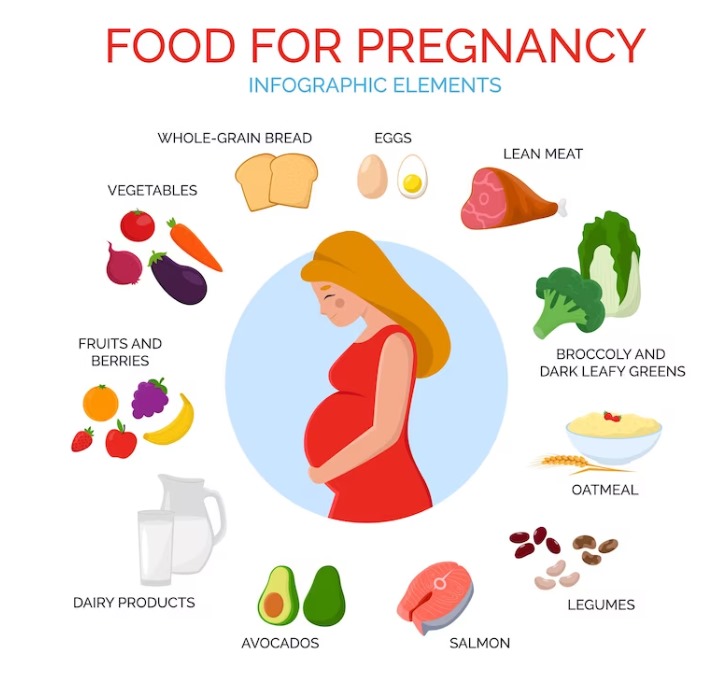
Food and Nutrients for Pregnant Women
Congratulations on your pregnancy! This is an exciting time in your life, and you want to make sure you're eating the right foods to keep yourself and your baby healthy. Here's a breakdown of the essential food groups and nutrients for pregnant women:
Protein
Protein is essential for building and repairing tissues, including your baby's growing body. Good sources of protein include:
- Lean meats, such as chicken, turkey, and fish
- Beans and lentils
- Eggs
- Dairy products, such as milk, yogurt, and cheese
- Nuts and seeds
Aim to include a source of protein at every meal and snack.
Calcium
Calcium is important for building strong bones and teeth for you and your baby. Good sources of calcium include:
- Dairy products, such as milk, yogurt, and cheese
- Leafy green vegetables, such as broccoli, kale, and spinach
- Fortified foods, such as orange juice and breakfast cereals
If you have trouble getting enough calcium from food alone, talk to your doctor about taking a supplement.
Iron
Iron is needed to produce red blood cells, which carry oxygen to your baby. Good sources of iron include:
- Lean meats, such as chicken, turkey, and beef
- Beans and lentils
- Iron-fortified cereals
- Spinach and other leafy green vegetables
You may also need to take an iron supplement, especially if you're carrying twins or multiples.
Folic acid
Folic acid is essential for preventing birth defects of the brain and spine. Good sources of folic acid include:
- Leafy green vegetables, such as broccoli and spinach
- Fortified cereals
- Citrus fruits and juices
- Beans and lentils
Most pregnant women are advised to take a folic acid supplement, even if they're eating a healthy diet.
Other important nutrients
Other important nutrients for pregnant women include:
- Vitamin D: Essential for bone health
- Vitamin C: For a strong immune system
- Vitamin A: For healthy vision and growth
- DHA: An omega-3 fatty acid that is important for brain development
You can get these nutrients from a variety of foods, including:
- Vitamin D: Fortified milk and orange juice, fatty fish, such as salmon and tuna, and eggs
- Vitamin C: Citrus fruits and juices, tomatoes, and broccoli
- Vitamin A: Carrots, sweet potatoes, and leafy green vegetables
- DHA: Fatty fish, such as salmon and tuna, and fortified eggs
If you're having trouble getting all the nutrients you need from food alone, talk to your doctor about taking a prenatal vitamin.
Here are some tips for eating a healthy diet during pregnancy:
- Eat plenty of fruits and vegetables. Aim for at least five servings per day.
- Choose whole grains over refined grains.
- Choose lean protein sources.
- Include healthy fats in your diet, such as those found in olive oil, nuts, and seeds.
- Limit processed foods, sugary drinks, and unhealthy fats.
- Drink plenty of water.
Here are some sample meals and snacks that are packed with nutrients:
- Breakfast: Oatmeal with berries and nuts, or yogurt with fruit and granola
- Lunch: Salad with grilled chicken or fish, or a lentil soup
- Dinner: Salmon with roasted vegetables, or chicken stir-fry with brown rice
- Snacks: Fruits and vegetables, nuts, seeds, or yogurt
By following these tips, you can ensure that you and your baby are getting the nutrients you need for a healthy pregnancy.
